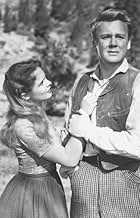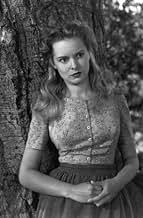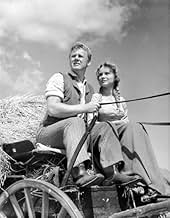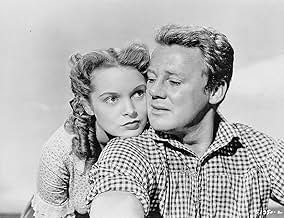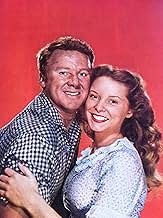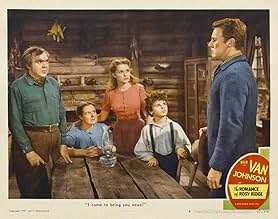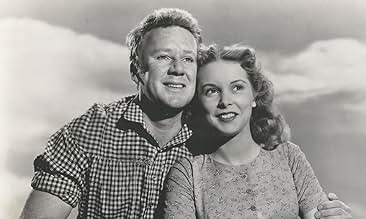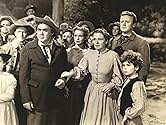In post-Civil War Missouri, friends, relatives and neighbors find it difficult to live harmoniously together knowing that some of them fought on opposing sides during the war.In post-Civil War Missouri, friends, relatives and neighbors find it difficult to live harmoniously together knowing that some of them fought on opposing sides during the war.In post-Civil War Missouri, friends, relatives and neighbors find it difficult to live harmoniously together knowing that some of them fought on opposing sides during the war.
- Awards
- 1 win total
Sam Ash
- Southerner
- (uncredited)
Polly Bailey
- Wife
- (uncredited)
- Director
- Writers
- All cast & crew
- Production, box office & more at IMDbPro
7.0797
1
2
3
4
5
6
7
8
9
10
Featured reviews
Janet Leigh's First Film
Discovered this Classic Film from 1947 playing on TCM and was very curious about just what this story would present and who was starring in this picture. It was surprising to see Van Johnson in the starring role as Henry Carson and veteran character actor Thomas Mitchell,(Gill MacBean. Janet Leigh was so young looking I hardly recognized her playing the role as a daughter to Gill MacBean, named Lessy Anne MacBean. This was the very first picture that Janet Leigh appeared in and she was very polished and professional even in her first important role of her career. The story deals with the ending of the Civil-War between the North and South and there were strong feelings still among the people in the South and Northerner's who traveled in their communities. Gill MacBean was not very thrilled about having Henry Carson getting too close to his daughter in a romantic way of speaking. Henry Carson wanted to establish a school in the local community and finding acceptance was very difficult for him to establish. There was a very deep secret that Henry Carson kept to himself about their son who was killed in the Civil War. There is Comedy, Drama and Romance and plenty of outstanding acting in this great Classic Film, Enjoy.
Something to say to us today
I loved the emphasis on community values in this film. The ideas that the main character pulls for are not a whit outdated and can certainly be applied to today's society. It seems that in life, as in this film, there is always an element who tries to pull apart the community spirit for their own ends. These ideas are presented here in a completely engaging manner and are there for all to see as simple common sense. Kudos to Thomas Mitchell for another grand performance. Too bad this is another forgotten film which should be resurrected for its ideas which are strangely hip and contemporary. And Janet Leigh does a wonderful job, as does the actress who plays her mother.
"If you're gonna stand by me ,don't stand too close"
The above line is from "Seven Brides for Seven Brothers" but a few more like it would have considerably enlivened this sometimes slow but in fact worthy post Civil War drama. However,there are at least two other real winners in the genuine mean style,and even more of the same could have raised this movie to an eight rather than a faltering seven. For example:
Exultant Wife:You'll always remember this day!
Husband:As long as you live I will.
And:
Idealist Jonson:I joined this war because no man should be hated for the color of his skin.
Confederate:It isn't about the color of anyone's skin, I hate the color of the pants you wore when you came down here against us.
Jonson:This thing was really about the color of my pants?
Unfortunately,the overall mood of the film is continuously uncertain.At times it is genuinely reflective and well timed ,at others it verges on the maudlin.Eleanor Parker or young Katherine Hepburn would have made a lot more of a hullabaloo with the same unchallenging script;Janet Leigh is simply too sweet and wholesome for words.
Still despite a couple of ridiculous brief musical spurts,there are a whole troop of fine character actors,including Thomas Mitchel,Marshal Thompson(particularly good in the climatic scene) and my old acquaintance the inimitable O.Z. Whitehead. Moreover,Van Jonson,for once,is not studio typecast and does a fine job throughout,particularly with his barn musicale and in the final scene.
All told, not the gem that it could have been but deserving of a lot better than it has ever yet been credited with.Definitely worth a look for any post Civil war buff or a family looking for a good clean afternoon's entertainment that has something to say.
The director here is man of all work Roy Rowlands.And the reason that I am doing this review is that Rowlands previously directed "Our Vines Have Tender Grapes",one of the high points of American family drama. He apparently never remotely reached such heights again.
The script derives from a story by Pulitzer Prize winner McKinley Kantor,a writer who more than once received less than he deserved by Hollywood.
Exultant Wife:You'll always remember this day!
Husband:As long as you live I will.
And:
Idealist Jonson:I joined this war because no man should be hated for the color of his skin.
Confederate:It isn't about the color of anyone's skin, I hate the color of the pants you wore when you came down here against us.
Jonson:This thing was really about the color of my pants?
Unfortunately,the overall mood of the film is continuously uncertain.At times it is genuinely reflective and well timed ,at others it verges on the maudlin.Eleanor Parker or young Katherine Hepburn would have made a lot more of a hullabaloo with the same unchallenging script;Janet Leigh is simply too sweet and wholesome for words.
Still despite a couple of ridiculous brief musical spurts,there are a whole troop of fine character actors,including Thomas Mitchel,Marshal Thompson(particularly good in the climatic scene) and my old acquaintance the inimitable O.Z. Whitehead. Moreover,Van Jonson,for once,is not studio typecast and does a fine job throughout,particularly with his barn musicale and in the final scene.
All told, not the gem that it could have been but deserving of a lot better than it has ever yet been credited with.Definitely worth a look for any post Civil war buff or a family looking for a good clean afternoon's entertainment that has something to say.
The director here is man of all work Roy Rowlands.And the reason that I am doing this review is that Rowlands previously directed "Our Vines Have Tender Grapes",one of the high points of American family drama. He apparently never remotely reached such heights again.
The script derives from a story by Pulitzer Prize winner McKinley Kantor,a writer who more than once received less than he deserved by Hollywood.
A marvelous film.
"The Romance of Rosy Ridge" surprised me a bit. While I assumed it would be a pretty good film given its cast, it turned out to be even better. It's a wonderful little film and I strongly recommend you see it.
The film is set in Missouri 1965--just after the Civil War. Rosy Ridge is a sad community because it was a divided town in a border state and folks fought on both sides during the war. Because of this, there is still a lot of acrimony among the locals--with someone burning barns of the ex-Confederates. One guy, Gill MacBean (Thomas Mitchell) has vowed NEVER to have anything to do with anyone who fought for the Union.
One day, a stranger, Henry Carson (Van Johnson) wanders by the MacBean farm. While Gill isn't very friendly, the rest of the family invites the man in for dinner and soon he ends up staying for some time. Now this stranger isn't a freeloader--he works very hard around the place and he's also very likable. However, when it comes to politics, he says very little and Gill cannot figure out which side this young man might have fought for in the war. If he is a Yankee, this is a serious problem for Gill, as his daughter, Lissy (Janet Leigh--in her first film) is falling for Henry. There is MUCH more to the film than this--but frankly it's better if you just see it for yourself. Suffice to say, there isn't much not to like about this film. The acting is very nice (particular by Johnson), the script superb (offering lots of twists and a wonderful surprise ending) and it's a nice look at American history. Exceptional.
By the way, although it's not the same, you do wonder if the film was the inspiration for the "Andy Griffith Show" episode "A Stranger in Town" as there are some similarities.
The film is set in Missouri 1965--just after the Civil War. Rosy Ridge is a sad community because it was a divided town in a border state and folks fought on both sides during the war. Because of this, there is still a lot of acrimony among the locals--with someone burning barns of the ex-Confederates. One guy, Gill MacBean (Thomas Mitchell) has vowed NEVER to have anything to do with anyone who fought for the Union.
One day, a stranger, Henry Carson (Van Johnson) wanders by the MacBean farm. While Gill isn't very friendly, the rest of the family invites the man in for dinner and soon he ends up staying for some time. Now this stranger isn't a freeloader--he works very hard around the place and he's also very likable. However, when it comes to politics, he says very little and Gill cannot figure out which side this young man might have fought for in the war. If he is a Yankee, this is a serious problem for Gill, as his daughter, Lissy (Janet Leigh--in her first film) is falling for Henry. There is MUCH more to the film than this--but frankly it's better if you just see it for yourself. Suffice to say, there isn't much not to like about this film. The acting is very nice (particular by Johnson), the script superb (offering lots of twists and a wonderful surprise ending) and it's a nice look at American history. Exceptional.
By the way, although it's not the same, you do wonder if the film was the inspiration for the "Andy Griffith Show" episode "A Stranger in Town" as there are some similarities.
10kspell
Worthy of a look
I found this movie very uplifting and I believe quite true. My grandmother married my grandfather in almost the same situation. He had come to TX and found her while attending a political rally. They fell in love and married almost right away. Her father, a confederate, disowned her an never saw her again, as my grandfather's dad had fought for the Union. As I was watching it was so well done I felt I was there. Van Johnson and Janet Leigh (even though very young and quite new) was real as it gets. Unfortunately the quality of the film is quite poor, but maybe it will be restored and offered for DVD sale. Dean Stockwell did a fantastic job and should have won an award. Also, Missouri being the state seemed almost real.
Did you know
- TriviaJanet Leigh said on TCM that Van Johnson was responsible for her stage name. He suggested she shorten her first name to Janet, and he thought that since the film they were doing was a civil war drama, Lee would go well. But then he suggested she spell it Leigh. She was concerned there might be confusion with Vivian Leigh, but then Johnson reminded her of Van Heflin. He said "There's two Van's and it hasn't hurt either of us."
- GoofsThe fixation of Gil on the color of Henry's britches makes no sense. Stereotypically the colors of the Union was supposed to be Navy jacket with sky blue trousers. Then Stereotypically for the Confederacy was supposed to be gray jacket with SKY BLUE trousers. The Confederacy copied the sky blue trousers because when they seceded and seized the federal stores throughout the South they obtained said sky blue trousers en masse. So, already officially this character's stereotypes are debunked. Further the state militias had their own colors as well. In fact some Northern militias (such as Indiana) had gray jackets and trousers while some Southern militias (such as Louisiana) had navy jackets and trousers, while others (on both sides) had red jackets and trousers. Finally, many of the poorer, again on either side, might have just sent their kin off to fight in butternut. So, Gil could check all he wanted to check. But he might find sky blue, navy, gray, red, or butternut. But any of those colors would NOT have distinguished on which side its wearer fought during the war. AND having lived in that time, having fought in the war, Gil would have known that fact.
- Quotes
Henry Carson: All those nights I was away from the farm, I dreamed of nothing but being up here. Place all fixed up and you waiting for me as I came up the trail. It's ours, Lissy. Nothing's gonna keep us from having it now.
- ConnectionsFeatured in Discovering Film: Janet Leigh (2015)
- How long is The Romance of Rosy Ridge?Powered by Alexa
Details
Box office
- Budget
- $2,117,000 (estimated)
- Runtime
- 1h 45m(105 min)
- Color
- Aspect ratio
- 1.37 : 1
Contribute to this page
Suggest an edit or add missing content


